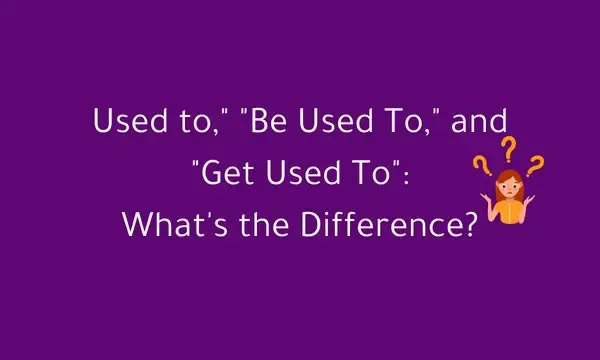"Used to," "Be Used To," and "Get Used To": What's the Difference?
Ever found yourself mixing up “used to”, “be used to”, and “get used to”? You’re not alone. These similar phrases can be tricky, even for advanced learners, but understanding their differences is key to expressing habits, familiarity, and change in English. By learning when and how to use these phrases, you can speak and write with far more precision and without being tense.
Whether you’re an ESL student working on improving your fluency or an experienced teacher looking for clear ways to explain these concepts to your students, this lesson will break down the distinctions and make them easy to grasp. Let’s talk about how these expressions work and give you the tools to use them confidently in your conversations and writing! Just follow up with the following explanations!
Used to
We use used to when we refer to things in the past which are no longer true. It can refer to repeated actions or to a state or situation:- I used to play tennis when I was a child. (Meaning: Playing tennis was a habit.)
- She used to play basketball for the local team, but she’s too old now.
- That blue house over there used to belong to my family.
- He used to ride his bicycle with strange people.
- He used to live in Thailand.
- I used to climb trees.
- I used to talk about my unusual future plans.
- I used to learn about the different forms of the verb 'use' in my grammar lessons.
Negative: didn’t use to
- It didn’t use to be so crowded in the shops as it is nowadays.
- I didn’t use to like broccoli when I was younger, but I love it now.
- I think we met once, a couple of years ago. Did you use to work with Kevin Harris?
Be used to
Be used to means ‘be accustomed to’ or ‘be familiar with’. It can refer to the past, present, or future. We follow be used to with a noun phrase, a pronoun, or the -ing form of a verb.- She is used to living in a big city.
- He is used to the city now and doesn't get lost anymore.
- She wasn't used to walking so much and her legs hurt after the hike.
- I'm an orator, so I am used to speaking in public and giving talks regularly.
- I'm a cook, so I am used to teaching others how to make spicy pizzas.
Get used to
- He is getting used to his new school.
- I am finding this new job hard, but I'm sure I'll get used to it soon.
- It took my father years to get used to living in Egypt after moving from London.
- I'm getting used to the noise now. I found it really difficult when I first moved in.
FAQs
- When we were kids, we used to invent amazing games. We would imagine we were the government and we would make crazy laws that everyone had to obey.
- We used to live in Manchester.

